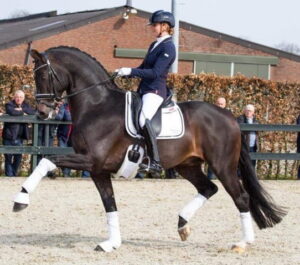
by Nancy Jaffer | Dec 23, 2024
Zen Elite Equestrian has done it again.
The stable that bought Helix, Adrienne Lyle’s U.S. team Paris Olympic mount, and Bohemian, who was reserve for the Paris Games with Endel Ots, has purchased Indian Rock for Adrienne’s 22-year-old student, Christian Simonson.
Ridden in Paris by the Netherlands’ Emilie Scholtens, the 11-year-old KWPN stallion by Apache (hence the inspiration for his name) finished eleventh in the Olympic freestyle with a score of 81.750. Emilie has competed the horse throughout his career.
Christian, tenth on the FEI’s U25 ratings, recalled his first ride on Rocky, who has not yet arrived in the U.S..
The rider’s initial impression was “Wow,” followed by “holy cow. He gave me this unbelievable feeling, like nothing I’ve ever felt.”
Christian explained, “From the very first moment that I rode him, I realized he has so much heart and power that I was a little speechless.”
While he found the horse “expressive,” he noted that even with his innate power, “he’s so harmonious and so beautiful. It gives you a goosebumps feeling, and he’s just so honest, he feels like he wants to try for you as a rider.”

Emilie Scholtens and Indian Rock. (Timo Martis Fotografie)
Christian had watched Rocky since he was a young horse, because he’s a fan of Emilie.
“She’s an incredibly kind person and more important, is a really amazing horsewoman. I thank her for all her kindness.”
Although the horse will be stabled in Wellington after he arrives in the U.S., Christian explained that Adrienne will weigh in on when he should start to show Rocky at Global as their relationship develops.
“I can’t wait to learn more about him as a horse,” said Christian.
“I’m over the moon and so, so excited and grateful,” he continued, effusively thanking Zen Elite’s Heidi Humphries for the opportunity.
“It’s one thing to be able to ride such a once-in-a lifetime horse and also to do it at my young age. It just feels extra special. I also have to thank Adrienne. I feel like the luckiest person to have this opportunity, and I feel even more lucky to be her student and be under her guidance.”
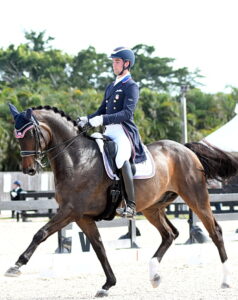
Christian Simonson and one of his own horses, Son of Lady. (Photo © 2024 by Nancy Jaffer)
A statement from Zen, based in Ft. Lauderdale, said, “We’re eager to see this promising partnership thrive and accomplish amazing thing.” Micha Knol of MRK Dressage arranged the sale of the stallion.
Zen does more than buy horses. It also is emerging as a big time sponsor. In addition to its group of dressage riders, Zen sponsors one jumper rider, Jill Briggs, and has been a sponsor of the Annual Series of Equestrian Sport Productions’ spring, summer, fall and holiday jumper shows for the last few years.
However, this year Zen is branching out even more and will be an official Winter Equestrian Festival title sponsor, backing the 1.30 meter jumper division.
“At Zen, the mission is to support equestrian sport at all levels, and they felt that this class was the perfect way to connect with both sides of the sport,” observed Zen’s spokeswoman, Kimberlyn Beaudoin.
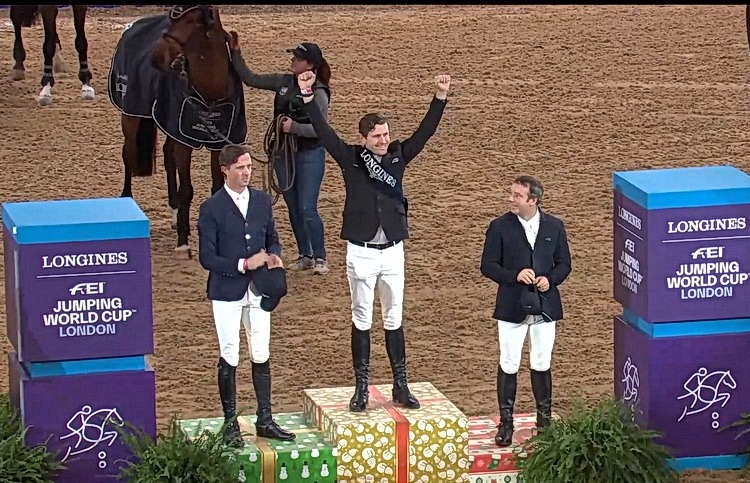
by Nancy Jaffer | Dec 22, 2024
“I went as fast as I could go and hoped it was good enough,” said Darragh Kenny, explaining the strategy that won him the Longines FEI World Cup Show Jumping Qualifier as the London International Horse Show wrapped up its festive run on Sunday.
“The way he felt today, I think I can have a really good shot at it,” the Irish rider mused before he went second on Eddy Blue in the five-horse jump-off. It appeared the combination to beat would be 2023 winner and home favorite Ben Maher, three-time Olympic gold medalist on Point Break.
On the second-line of the jump-off course, however, Darragh took five strides between the fences while the British competitor, fourth to go, took six strides. That decision turned out to be the difference between the winning time of 34.76 seconds and second-place in 35.15. Third place went to the fastest 4-faulter in the jump-off, Robert Whitaker of Great Britain, clocked in 37.89 seconds on Vermento.
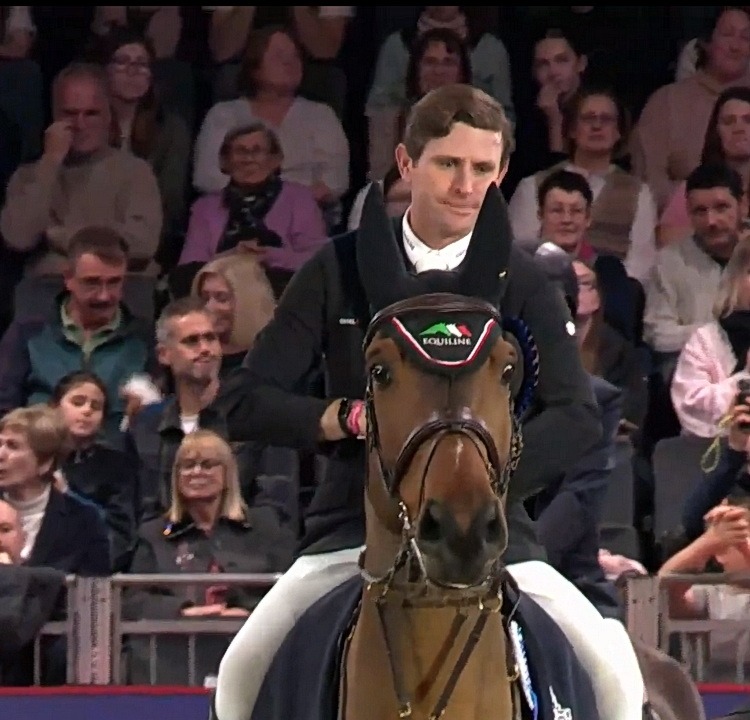
Victory at the London International meant a great deal to Darragh Kenny.
“I’ve watched this show since I was four years old,” recalled a delighted Darragh, who also took the leading rider title.
“It’s just an incredible show, the feeling is unbelievable, the crowd is just the best ever. It’s just really fun to be able to win it.”
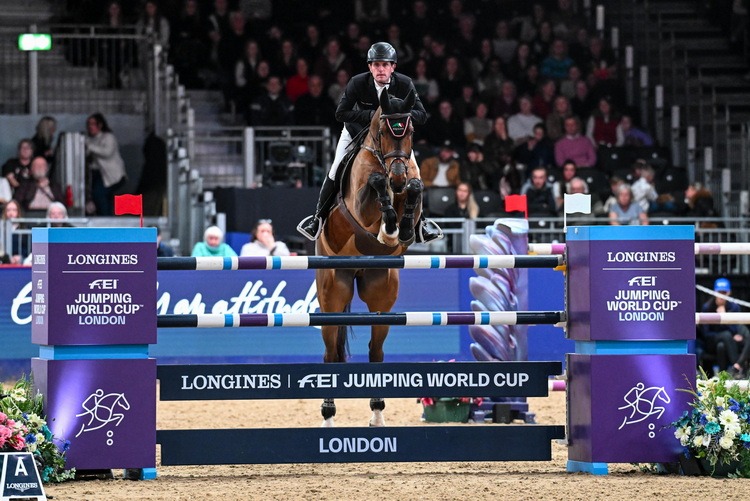
Darragh Kenny on his way to victory with Eddy Blue. (Photo courtesy London International)
For his part, Ben said, “Point Break is in amazing form and gives me great confidence. He doesn’t have so much experience in the jump-offs, but he has to learn one day.”
This is literally a home show for Ben, as he lives nearby.
“It’s always great to be here; Christmas spirit,” he remarked.
And true enough, the show at the ExCeL arena is as much about Christmas as it is top sport. The tradition that began when it was at its former home in the Olympia facility continues, as Father Christmas (Santa on the U.S. side of the Atlantic) with a jolly ho-ho-ho came in pulled by a pair of white horses, and a contingent of green-clad elves did a little dance as flakes of artificial snow came down while the crowd sang “The First Noel.”
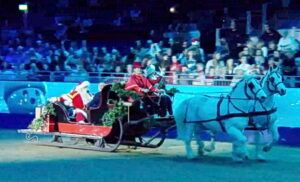
Father Christmas makes his entrance.
Austria’s Max Kuhner, twelfth on EIC Anton Sbk Z with a knockdown in the first round, noted his horse “was a little bit impressed from the beginning with the atmosphere,” and indeed, it was a lot to take in.
That was especially true over the route designed by Bernardo Costa Cabral of Portugal and his team, where the usual triple-combination was accompanied by an unusual pairing of two double-combinations that spelled trouble for 14 entries.
“It’s trappy everywhere,” commented British rider Scott Brash, who said the course was fair but called the arena “a tricky ring,” with the crowd close to the action along the rail.
The class was practically awash in Whitakers, with three of them competing. Robert is the son of John Whitaker, who rode in other classes at the show. When I started covering international shows in the 1980s, John and his brother, Michael, were pillars of the British team, and now their children are top competitors as well. The Brits aren’t just training the new generation of riders, they are breeding them!
Other highlights of London include the dressage World Cup Qualifier, the second feature on this website, and the four-in-hand driving World Cup Qualifier. Three driving teams returned for the drive-off. Despite incurring penalties for two balls that fell from the cones, the Netherlands’ Ijsbrand Chardon won. Ten-time FEI World Cup™ Final winner Boyd Exell of Australia was second with Friday’s winner Dries Degrieck of Belgium in third.
The riders have had quite a month with London following the Geneva show (read about it here and here), and different winners in each spectacular competition. Now, paraphrasing Santa, it’s merry Christmas to all horses and riders, and to all a good rest.
Click here for results
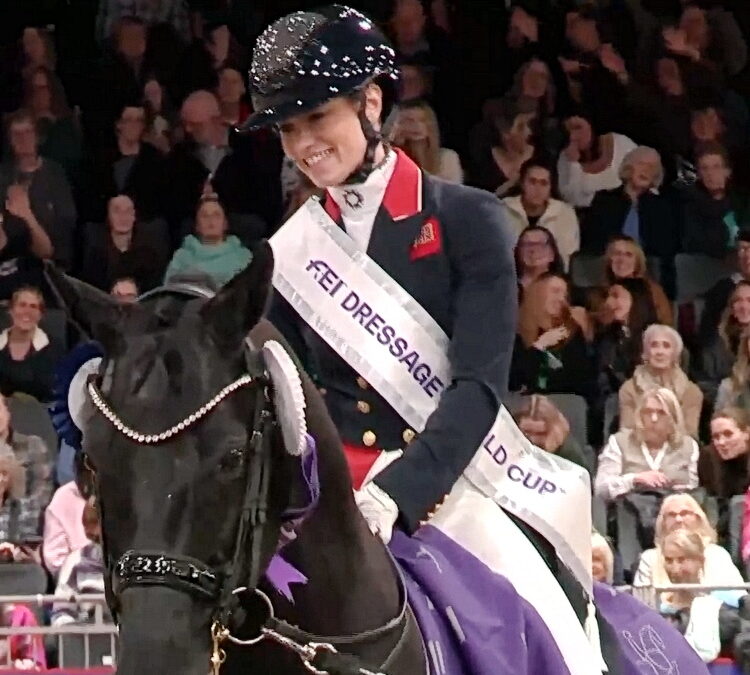
by Nancy Jaffer | Dec 19, 2024
From the moment that the majestic notes of “God Save the King” rang out as Lottie Fry entered the ring for her dresage Freestyle at the London International Horse Show on Thursday evening, there was a sense of a great occasion.
The British star didn’t disappoint, putting on quite a show at the ExCeL Arena with Glamourdale, the lustrous 13-year-old black KWPN stallion who collected marks of 10 not only for his trademark extended canter, but also received that distinction for music and choreography, with many 9s along the way in the Longines FEI World Cup Qualifier.

Lottie Fry and Glamourdale stretch it out in the extended trot. (Peter Nixon photo)
Lottie and the horse delivered a winning performance worthy of their 2022 world championship title, with just a minor glitch in the one-tempis, as they made up for a few mistakes that had placed them a surprising third in Wednesday’s Grand Prix. There she finished behind not onlyher Olympic teammate, winner Becky Moody with Jagerbomb, who won, but alsoNorway’s Isabel Freese, second in that class with Total Hope OLD.
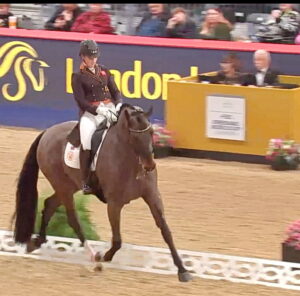
Becky Moody and Jagerbomb.
As she started her Freestyle to the notes of “Another One Bites the Dust,” Lottie blazed into a powerful passage before her halt, then resumed passage and flawlessly transitioned to an energetic piaffe, earning a 9 and 8.5s for her entrance and halt.
The judges loved her, reflected in the winning score of 86.645 percent, with four of the five officials giving her artistic marks of more than 90 percent.
The crowd felt the same appreciation, enjoying watching the Netherlands-based rider demonstrate such expertise in her home country. Spectators were with her every minute, clapping along to her piaffe pirouette before her final halt.
At the awards ceremony, an overjoyed Lottie told fans, “The feeling I had in here tonight was something I’ve never felt before. He was absolutely incredible.
“He was on fire,” she said of Glamourdale.. I was so thankful to be able to do that in London in front of this crowd.”
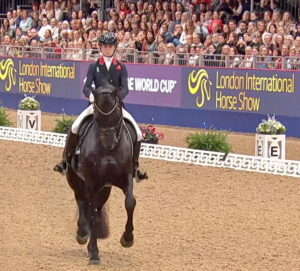
Lottie Fry and Glamourdale
She added “I can’t thank you all enough for the support, not just tonight, but also the whole year running up to Paris (Olympics) and also in Paris. We could feel all your support; very, very grateful.”
As Lottie noted, “That makes it a little emotional to come back to England and ride in front of you all. It’s really an honor.”
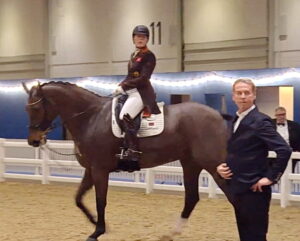
Trainer Carl Hester consulted with Becky Moody after her Freestyle.
Becky was one of five British riders in the 14-strong field that did not include any U.S. riders.
She had made a huge splash with her homebred Jagerbomb in his 2023 debut at the show, and wound up competing on her nation’s bronze medal Olympic team last summer.
Her win in the Grand Prix this week was a good start, but mistakes in the Freestyle meant she wound up a disappointing fourth. A canter break in her right pirouette sank her standing with a mark of 3 and two 4s.
In the end, she got a decent score of 80.6, but not what she had hoped for. The crowd loved her anyway.
Isabel was second again with her consistent son of Totilas (83.270), who is out of Weihegold OLD, the World Cup champion of Germany’s Isabel Werth.
“This exceeds all my expectations,” said Isabel about her ride.
“I am so proud. It has always been a dream to compete here. I’ve just been eight weeks out of the saddle after a surgery, which made this result even more special. My groom took exceptional care of Total Hope, and perhaps the break was beneficial for both of us. He is in fantastic form.”
The Netherlands’ Dinja van Liere was further back in third on Hartsuijker (80.225), a big promotion from sixth place in the Grand Prix.
Click here for results
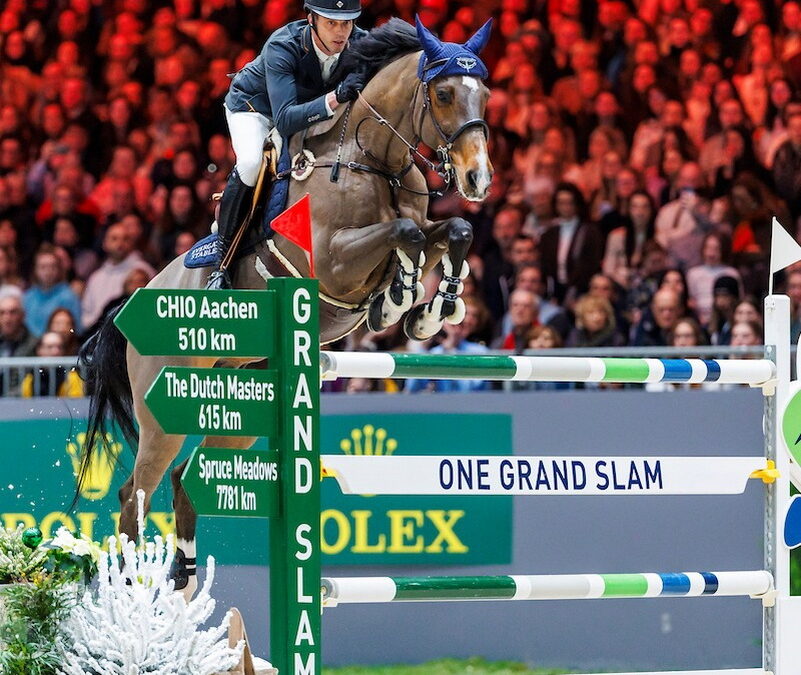
by Nancy Jaffer | Dec 15, 2024
McLain Ward came close to topping a historically strong show jumping field on Sunday, but a heartbreaking rail at the last fence in the jump-off gave the Rolex Grand Prix in Geneva to the Netherlands’ Harrie Smolders, who picked up a check for $419, 442 in the process.
It was the first-ever 5-star victory at 1.60 meters for Harry’s mount, Monaco, who had finished second 11 times outside of championships, according to EquiRatings.
The fastest time of 41.48 seconds in the 10-horse tiebreaker was recorded by McLain, riding his Olympic USA team silver medal mount Ilex, with whom he has partnered for a mere 10 months. His clocking would have beaten the winner’s mark of a clear trip in 41.74 seconds, were it not for that pole dropping from the Rolex vertical with a mere unlucky touch of a hind hoof.
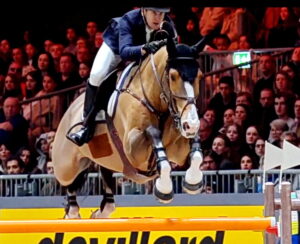
McLain Ward and Ilex.
Harrie had the disadvantage of being first to go in the jump-off; McLain had the advantage of being last to go.
As it was, McLain finished fourth in a field that was the sport’s strongest grand prix in 14 years, ever since EquiRatings started keeping those stats. The contenders included two Olympic individual gold medalists, the European champion, the world-ranked number one horse and rider (who also hold the world champion title) and former European Champion Martin Fuchs, who had won the Rolex International Jumper Riders Club Top Ten Final Friday night at the Palexpo arena. (Click here to read this story.)
So fourth place in such a high-caliber class is impressive, but not much consolation for missing out on the big prize. “I’m always disappointed not to win a big event, but it was a brilliant way to finish off what I consider a great year with Ilex,” McLain told me.
“Only beginning to ride him in February and to be able to put together the season we have is a testament to his talent, and I am very appreciative to all of the people around us make that happen,” he said while also praising his Dutch-bred gelding.
McLain, who can now take a few deep breaths, added “I’m very much looking forward to a bit of a Christmas rest with my family and to a great 2025. I always remind myself I’m very fortunate to play a game for a living.”
As he accepted his trophy moments after his victory aboard his 15-year-old Holsteiner, Harrie enthused, “I’m extremely happy. Monaco really deserved this win. Fantastic what this horse has done for me.
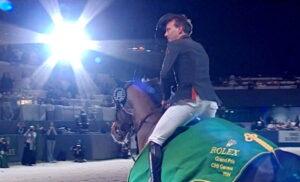
Harrie Smolders takes the spotlight.
“To start the jump-off in a field like this I think it is nearly possible to go straightaway from the first rider to win this, all riders behind you can go faster. He’s (Monaco) in fantastic shape at the moment, he’s so smart, so experienced. What he showed today is outstanding.”
Harrie admitted to the situation being “nerve-wracking,” noting that the riders coming after him could watch what he did and figure out where to make up their time on the course so they could go faster
“I really took my chances. I didn’t know if it was enough,” said Harrie, “I really took my chances. I didn’t know if it was enough, especially in this ring horses with a bigger stride have a little bit of advantage in a jump-off.”
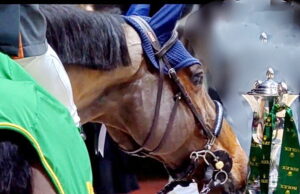
Monaco checks out his trophy.
Harrie now has the first segment of the four-leg Rolex Grand Slam to his credit and moves on in 2025 to the next, in his home town of s’Hertogenbosch.
All four Grand Slam grands prix must be won in a row, so Martin’s September victory at Spruce Meadows no longer counts toward the Grand Slam for him, and he must start over.
Second place went to Giulia Martinengo Marquet, who rides in the uniform of the Italian air force. Her clean ride on the Selle Francais Delta Del’Isle was timed in 43.75 seconds and kept her EquiRatings record for clean jump-off rounds at 100 percent, though this was only her third such trip.
Right behind her was the promising young Belgian rider Gilles Thomas, on the Selle Francais stallion Ermitage Kalone in 44.77. He is also rated by EquiRatings at 100 percent, though again, this only his third jump-off at this level with the horse.
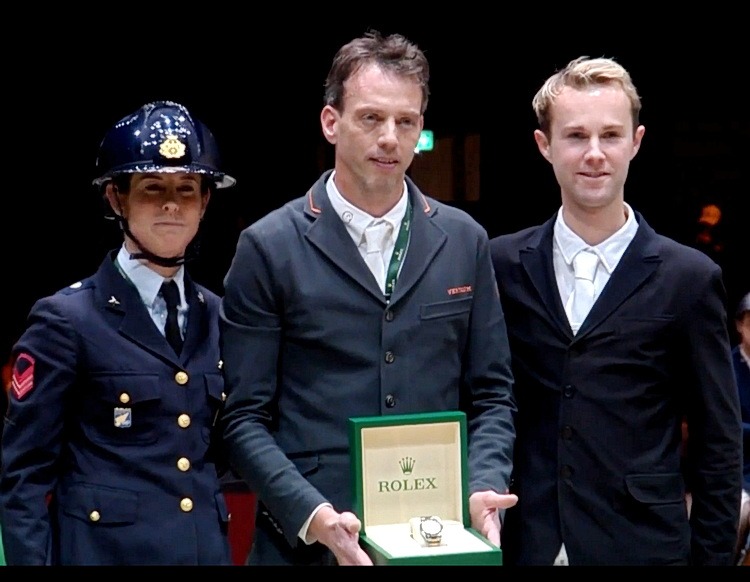
The podium: Harrie Smolders still can’t believe he won; Giulia Martinengo Marquet was second and Gilles Thomas third.
The class wound up having as many twists and turns as the course designed by Gérard Lachat of Switzerland and Gregory Bodo of France, who also did the Olympic routes in Paris with Santiago Varela.

The course for the Rolex Grand Prix
And speaking of Paris, the Alexandre III Bridge jump from the Paris Games wound up being a big time troublemaker. World Number One Henrik von Eckermann of Sweden had a run-out there with King Edward, mirroring a run-out he had in the second round of Friday’s Top Ten at a narrow fence of white rails. That’s on top of a disappointing fall at the Olympics.
Henrik’s compatriot, Peder Fredricson, also experienced a run-out at the Alexandre bridge in the Grand Prix jump-off with Catch Me Not to wind up sixth. Martin Fuchs broke a rail there with Leone Jei, who then not surprisingly dropped a pole at the first element of the double combination that came next. At a different fence, Italy’s Lorenzo de Luca came off Denver de Talma when the horse couldn’t negotiate the distance to the Rolex oxer that was the second-to-last obstacle in the jump-off.

Peder Fredricson at the troublesome Alexandre III bridge.
Two-time Rolex Geneva Grand Prix winner Kent Farrington of the U.S., had a rail at the oxer that was the B element of a double in the first round, and missed out on the jump-off with Greya, but finished twelfth as the fastest 4-faulter.
The first round was quite something. The list of eight riders who retired there after knockdowns included the USA’s Olympic team silver medalist Karl Cook with Caracole de la Roque following three dropped rails, and European Champion Steve Guerdat of Switzerland with Dynamix de Belheme, as well as other big names, among them Daniel Coyle of Ireland and Germany’s Marcus Ehning.
Click here for results
The big show as the year comes to a close is the London International, set to start Wednesday, with dressage and driving as well as show jumping, and a host of exhibitions.

by Nancy Jaffer | Dec 13, 2024
As of Nov. 30, Switzerland’s Martin Fuchs was ranked number 11 in the world, which meant at the entry deadline, he didn’t qualify for Friday night’s Rolex International Jumper Riders Club Top Ten Final competition in Geneva.
But when number 10, Irishman Conor Swail, couldn’t get transportation for his horses from California to Switzerland, he dropped out and Martin (who was one point behind him in the FEI standings last month) dropped in to the Palexpo arena in his home country.
Martin made the substitution worthwhile, delighting a packed house when he and the Dutch-bred Leone Jei won the $556,702 competition, edging the USA’s Kent Farrington, a two-time Top 10 winner. Third went to Ben Maher of Great Britain, also a previous winner of the prestigious competition, who was double clear but slower than the top two with Point Break.
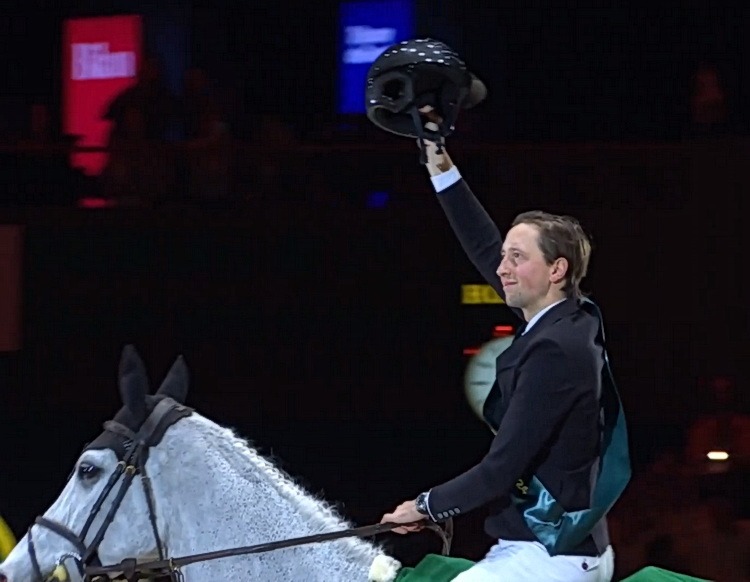
Martin Fuchs and Leone Jei salute the crowd after victory in the Top Ten class.
“It’s incredible,” said Martin after a victory that was understandably popular with the crowd, which was mostly Swiss. He used the word “fantastic” more than once in describing the achievement, which carried a $178,565 prize for his first victory in six tries competing in the class.
The former European champion called it a “nice win, especially (since) my loyal owner, Adolfo Juri…couldn’t be here tonight because he’s taken to hospital.. So Adolfo, I am sending my best wishes for recovery and say thanks for everything he does for me, for these amazing horses, for his incredible opportunity and for this long-lived partnership.”
Martin noted, “I received a call from Conor Swail on Sunday night saying his flight been cancelled, and that I was therefore in the class and I should try to win it. I carried these words with me for the entire week. I rode my top horse, Leone Jei, for this class because it is one that I really wanted to win. It was a big goal in my career so I am happy that tonight was my night.”
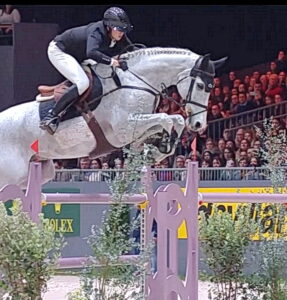
Martin Fuchs and Leone Jei on the way to victory.
The class consisted of two rounds, with faults from the first, which had 15 jumping efforts, carried over to the second, with 10 efforts and the clock ticking down who would win.
Martin’s double clear in a 47.02-second run presented quite a target, and aim was taken by the USA’s Kent Farrington, number four on the FEI ranking list, with the swift Zangersheide mare, Toulayna.
He fell short, however, finishing his fault-free effort in 48.05 seconds and blaming himself for not being able to catch Martin.
“I’m not happy,” said Kent.
“I’m very happy with my horse, I thought she was incredible. I thought I rode not so good.”
He said he got too far out as he pushed for speed and had to add a stride to get to the double combination “and it cost me the class today.”
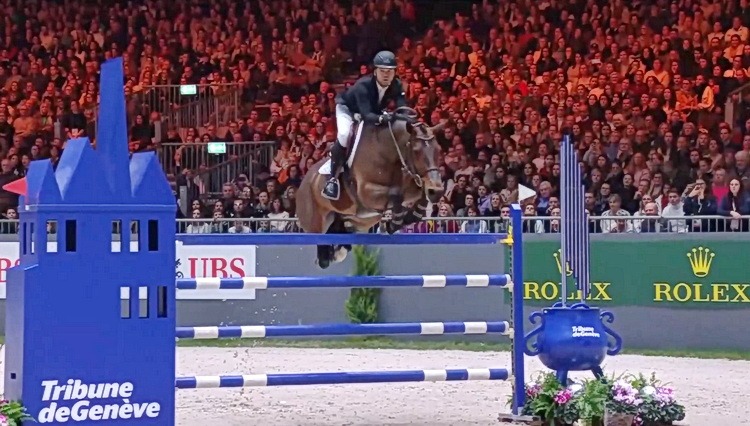
Kent Farrington and Toulayna.
Kent added ruefully, “Great effort from my horse; she needs a better rider.”
For Sunday’s Rolex grand prix, he will be riding Greya.
“Same rider; hopefully, I do better.”
But things went better for him than for world number one Henrik von Eckermann of Sweden and his partner, King Edward, the 2022 winners of the Top 10 and the leaders after the first round in the 2024 edition. This year, the combination had 17 clear trips in 24 competitions set at 1.60 meters before Friday’s competition, and they hoped to improve the percentage in Geneva.

The courses for the Geneva Top Ten.
But in the second round, the gelding stopped at a narrow fence with white rails, third from the end of the course laid out by Gerard Lechat of Switzerland and Gregory Bodo, one of the designers of the Paris Olympic routes. Henrik turned King Edward around and jumped the obstacle, but wound up seventh with the Belgian warmblood in 59.13 seconds—just within the 60-second time allowed. The incident was reminiscent of the shocking conclusion to his performance in the individual jumping at the Olympics, when King Edward went one way at a fence and Henrik went the other as they parted company.
“I felt I was a little bit behind on the wall and got one two many strides there,” said Henrik, analyzing why his horse stopped in the Palexpo.
“I knew I had to make it up somewhere, I didn’t get the turn in a good way.”
He noted, however, he had predicted Martin would win, saying wryly, “and he did, so that’s something, anyway.”

On the podium: Martin Fuchs, Kent Farrington and Ben Maher.
The only other U.S. rider in the competition was McLain Ward, fifth with his Olympic horse, Ilex. In the first round, they dropped a rail at the last fence, a vertical, and that scuttled his chances to win.
McLain called it “a little bit of a foolish fault,” noting it involved “a light touch on top (of the rail); frustrating but that’s the game” and he came back with a clear trip in the second round.
He called Ilex a “brilliant partner all year” and will jump him in Sunday’s grand prix.
Geneva is an impressive show, with lots of entertainment and style. The ring looked beautiful, with a miniature lake in the middle and interesting fences, including one topped by models of four Swiss cows. Ben Maher said that intimidated his horse, joking “he’s never seen a cow.”
Click here for results
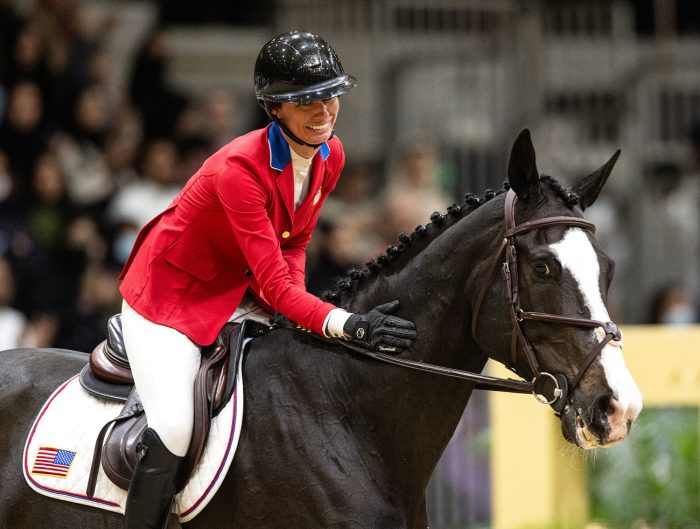
by Nancy Jaffer | Dec 9, 2024
Ask yourself this question: Do you know what medication and therapy your horse is receiving, and why? Is there a good reason for it? Most of all, is it safe?
The Chromatic Fund, formally unveiled last week, will pay for collaborative research and education enabling veterinarians to be updated as they make decisions about horse care at competitions and elsewhere.
The initiative has the earmarks of being a lifesaver.
The fund will facilitate a ground-breaking effort under the auspices of the U.S. Equestrian Federation and American Association of Equine Practitioners, designed to make a big difference in the lives and careers of sport horses.
It all started because Kc Branscomb wasn’t going to give up.
She knew something had to be done following the death of Chromatic BF, a grand prix show jumper she bred, raised and loved.

A carefree Chromatic galloping through the fields of his California home.
The 13-year-old gelding competed at April’s FEI World Cup Show Jumping Final in Saudi Arabia, where he finished third in the second leg of the competition. Upon his return to the stables after an ebullient round of honor, a USEF-appointed veterinarian injected him with a cocktail of five drugs (none of which were prohibited substances), ostensibly to aid Chromatic with recovery after his big effort. Minutes later, the horse went into shock, collapsed and died.
Branscomb took issue with the results of a necropsy performed in Saudi Arabia that pointed toward an exercise-associated fatal pulmonary hemorrhage. According to the final report, the administered medications were not identified as the cause of death.
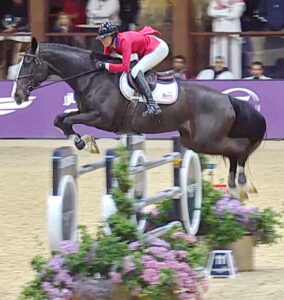
Chromatic ccompeting in Saudi Arabia.
But Branscomb insisted on better answers, including why the substances were injected, and beyond that, how to insure no other sport horse would suffer the same fate as Chromatic.
She made sure USEF listened, and also approached AAEP about her concerns. That led to a new welfare initiative and creation of the fund. The fund’s process, which also includes Branscomb’s input and the work of the Foundation for the Horse, is taking a worldwide perspective on a multi-faceted agenda.
Branscomb made an initial gift to kick-start the fund, matching a pledge from USEF, but the goal is to go beyond six figures and raise $2 million. For more information or to donate, go to this link — https://www.foundationforthehorse.org/support/chromaticfund.
The focus is on appropriate use of medication and other therapeutic interventions in equine athletes across the disciplines. The fund will pay for “science-based, equine-specific research and information access to benefit the health, well-being, and career longevity of horses in sport.”
Branscomb wants to get scientific information on untested therapies and the right dosages; how do you get the best efficacy while keeping the horse safe?
“We are dedicated to enhancing our welfare initiatives for sport horses announced in August,” said USEF CEO Bill Moroney, citing “the perfect partnership to set this education and research program on the right path to success.”
That’s particularly important in the era of horse sports seeking social license to operate from the general public. There have, for instance, already been petitions to the U.S. Olympic Committee asking that equestrian competition be excluded from the Games. Competition horses are a favorite target of animal rights groups.
In September, the advisory board of industry stakeholders that oversees the Chromatic Fund spent a day at AAEP headquarters in Lexington Ky., asking about the opportunities to sustainably improve the safety, welfare and longevity of the horses, and “do that in a way that wouldn’t adversely impact the sport itself? Most of us believe well-cared-for, healthy horses enjoy competing,” said Branscomb.
The result was a document listing the decisions and agreements the advisory board arrived at when they “explored rules, regulatory issues and questions of whether the problem was that the research is available, but just not getting out there to riders, trainers and the vets who are treating horses,” she continued.
Another facet involves determining whether the proper amount of research has been done on widely used emerging therapies and homeopathics.
“There is a huge amount of benefit and improvement that can be made just by properly curating the already available research and getting it out in practical, usable ways to veterinarians and clients; trainers, riders and owners hiring those vets,” said Branscomb.
She noted that if the vet who treated her horse at the World Cup had access to, and been informed on, peer review and academic papers about use of a product containing selenium (one of the components in the mixture given to Chromatic) he would have known there was no scientific evidence it does anything for muscle recovery and should only be given only over a course of treatment to horses who are deficient in that selenium.
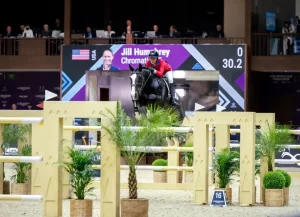
Chromatic finished third in the second round of the World Cup.
As Branscomb explained the fund’s goals, she noted, “This is about available information not getting into right hands and not being paid attention to. So what we’re hoping to do with this…is bring the very best academic veterinarians who are doing the academic research and the top 30 treating vets in world, and get them together with top research veterinarians over a day or two to talk (this) through.”
The goal is a handbook for use by treating veterinarians in equestrian sport, covering items such as inflammation, cardiovascular fitness recovery rate and immune system response, “so many aspects of what makes a horse be able to perform at its very best and be healthy.”
The handbook would lay out protocols such as “do this, don’t do this and if you do this, here are the risks.”
That’s one part of the program. Another, according to Branscomb, is insuring that owners, the “ultimate custodians” of the animal, can educate themselves and have pertinent information to make therapeutic decisions for their horse, rather than simply relying on trainers who may feel pressured to win. It could “change the culture,” or “at the very least, determine which practices are potentially harmful or helpful.
“I think we need to find out what the impact is of injecting hocks every six weeks in horses that are six to eight years of age. I think there’s plenty of research that shows that can have an impact on potentially shortening a horse’s career. An owner should have an opportunity to ask intelligent questions,” said Branscomb.
She mentioned that there are “too many examples of `Well, let’s try this’… without really a scientific basis or any evidence that what they are trying is going to work.
The research will take time and the advisory board is looking at various ways to handle it. In addition to Branscomb and Moroney, the board includes Sonja Keating, the USEF’s chief operating officer and general counsel; Dr. Tracy Turner, president-elect of the AAEP and the Foundation for The Horse; Olympic show jumping medalist and trainer Norman Dello Joio; Dr. Jack Snyder, an FEI-certified treating veterinarian and Dr. John Madigan, distinguished professor emeritus of the University California Davis school of veterinary medicine and board certified animal welfare specialist with a focus on equine.
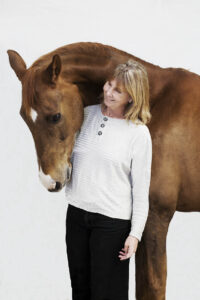
Kc Branscomb and amateur-owner hunter PakNSave. (Photo by Donna DeMari)
Branscomb noted sport governance organizations put out a list of prohibited substances, but there is “no discussion about tens of thousands of different therapies and medications; not even any discussion of `should they be limited and who should apply them?’
“It’s unbelievable how many drugs are in peoples’ (tack) trunks, being administered by people who are not veterinarians, things that are widely used. Those are permitted substances, depending on how and when they are administered, alongside other drugs, and who administers them. There’s a lot of information about what is safe and not safe, but that is not out there in the hands of people using those drugs.”
There needs to be a level of accountability and some kind of consequences when someone makes a mistake, she believes, noting the International Sport Horse Veterinary Association has made a set of recommendations to the FEI (international equestrian federation) for rules on how to supervise and insure best-in-class knowledge is being utilized.
“I don’t know if USEF or FEI will lead, but I believe in the next 12 months, both organizations will make a major change in management of how medications are reviewed and applied within the context of permitted substances,” said Branscomb,
She lobbied successfully for revisions to the USEF’s Horse Participation Consent Agreement in terms of treatments that can be given without permission to horses representing the USA. A change was made to say that except in an emergency, no medications will be administered to horses by team veterinarians at international competitions without prior consent of the athlete (a rider or driver), who is the person responsible under FEI regulations for substances present in a horse.
This week at the U.S. Hunter Jumper Association’s convention, Branscomb will receive the Mrs. A.C. Randolph Owners Legacy Award, which recognizes past or current owners who have been loyal patrons of the industry.
USHJA called her a significant figure in the hunter/jumper industry for many years, making her mark as a breeder dedicated to producing top sport horses at Branscomb Farm in California. She has cultivated a breeding program prioritizing both talent and temperament, USHJA noted in announcing the award, while citing her work with USEF “to advocate for changes in the role of owners in international competitions.”
Branscomb’s persistence, which has achieved much, was fueled by devotion.
“I loved my horse and what happened should never have happened,” she stated.
“I set out to make sure it would never happen again and in that process, I learned there were some holes in the safety net that was supposed to protect our horses, and there was some lack of understanding and knowledge that was readily available that would have kept my horse safe and alive. I wanted to make sure that got fixed.
“We have an opportunity to lead from the front and do it right, and have the sport be celebrated and leave the parts that we love intact and just have better-informed therapeutic care of the animal.”
































